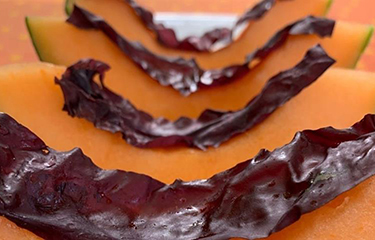SeafoodSource is closely following seaweed innovation by compiling a regular round-up of updates from the sector.
- Shinan County, South Korea-based seafood-grower Sinan Bada is marketing the one of the first seaweed products to by jointly certified by the Marine Stewardship Council (MSC) and the Aquaculture Stewardship Council (ASC).
Sinan Bada's laver seaweed is in high demand in South Korea, MSC Korea Program Director Mark Seo said. The product will be sold by Pulmuone Food Co. as part of a memorandum of understanding (MoU) between the two companies, the local government of Shinan County, and MSC.
“Through this MoU, we will expand the responsible and sustainable seaweed market by actively promoting Shinan's certified seaweed products," Seo said. "Laver is extremely important to the local economy, with indigenous production methods passed down the generations. This agreement aims to preserve that heritage working with the locally community in a manner that is socially responsible.”
ASC-MSC Seaweed Manager Patricia Bianchi said the partnership will significantly increase the supply of sustainable seaweed in South Korea and will protect the UNESCO-recognized marine ecosystem of Jeollanam-do.
"Commitments to sustainable production such as that made by Sinan Bada will play a crucial role in preserving marine ecosystems. With a growing demand for seaweed globally, it is crucial to demonstrate that seaweed comes from a sustainable source. Consumers in Korea can now support producers’ efforts by looking for the MSC and ASC labels on seaweed products."
The first MSC-ASC jointly certified seaweed products hit the South Korean market in 2019. At least 11 seaweed farms in South Korea had obtained the certification by 2020.
- Biddeford, Maine U.S.A-based Oceans Balance recently acquired a 50-foot long, 17-ton kelp dryer from South Africa to aid it in processing its seaweed products.
“The kelp harvest always comes in at the same time of year, March through May, and you can’t dry it outside if you’re in a cold climate, so we had to freeze it,” Oceans Balance CEO Mitchell Lench said. “But frozen kelp has a limited market. Ninety percent of the [global kelp] market is dried kelp.”
The machine cost USD 650,000 (EUR 590,000), The Global Seafood Alliance reported on 17 July. Lench said the company is exploring the idea of sharing it with other local seaweed farmers in Maine through a new company, Seaweed Farmer Services, Lench formed earlier this year.
“If you can dehydrate seaweed, which is very sticky, then you can dehydrate almost anything through this machine, so we think this will be of interest to agricultural producers," Lench said. "But in the meantime, we’re getting calls daily from kelp farmers in British Columbia, Alaska, and Norway who have run into the same issue and who are interested in using our dehydrator."
-On 7 June, the United Nations released its 2023 Assessment on the Potential of Sustainable Upscaling for Climate, Communities and the Planet report. The report assesses the potential future for seaweed farming and its sustainable upscaling.
According to the U.N., the report, “delivers an in-depth literature review and situational analysis scientifically assessing the potential for the sustainable expansion of seaweed farming to deliver climate benefits with minimal environmental and social risks.”
- To boost youth involvement in the seaweed and mariculture sector in the U.S. state of Maine, the Maine Aquaculture Association partnered with Educate Maine and the Gulf of Maine Research Institute to launch its first Shellfish and Seaweed Aquaculture Apprenticeship program.
The program works with students ages 18 and older to explore various career paths in the seaweed and shellfish innovation sector in Maine.
The state-certified aquaculture pre-apprentice program launched for the first time this spring, and will last one year, WABI reported. The program consists of 144 hours of classroom time at Southern Maine Community College and hands-on fieldwork.
Photo courtesy of Oceans Balance







